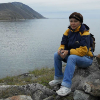From Chukotka with Love
October 6, 2016
Natalia Radunovich has dedicated her life to the promotion and recognition of Indigenous Russian languages. She is an Inuit linguist and lexicographer from Chukotka, a region located on the north easternmost tip of Russia. Radunovich is a professor at the Chukotskiy Multi-field College in Anadyr, the capital of Chukotka. There she teaches Russian language, literature, the Russian Eskimo language, and Indigenous literature.
“In the Chukotka Autonomous District, the culture of the Indigenous peoples of Chukotka and the development of native languages receive a lot of attention,” explains Radunovich. There are festivals, competitions and post-secondary programs that focus on the promotion of Chukotka Indigenous culture and language. Radunovich is regarded as one of her culture’s most celebrated champions.
Radunovich has been lauded for her work spanning over two decades to promote Russian Indigenous languages. The culmination of her work resulted in the 2014 “Russian-Eskimo Dictionary,” which saw over 19,000 Indigenous words translated into Russian texts for the first time. Radunovich poured ten years into working on this one project. When she is not teaching, she works as a journalist and host on an Indigenous Chukotka radio station promoting her culture and language.
Her area is home to many widely dispersed Indigenous communities, including many Inuit settlements. While her area may be the other side of the world from many Inuit living in Canada or Greenland, the issues she speaks of are common among the entire circumpolar world.
Radunovich works as a representative for Chukotka in the Inuit Circumpolar Council, she says although culturally there are many similarities, she wishes that Inuit in her region would have more ties to other Inuit in Canada and Greenland.
“Unfortunately, the ties between our Inuit and the Inuit of the Western Hemisphere could be tighter,” says Radunovich, “if it was not for the language barrier, and for the other reasons, related to politics. The Eskimos of Chukotka have pretty good communication with Eskimos from St. Lawrence Island in the U.S. because both groups speak the same language, Yup’ik.”
Research is an important topic for Inuit around the world. Radunovich says that researchers in Russia are realizing that Indigenous People are the people who know their lands and waters better than anyone, and they are invaluable assets to the important work being done in the area.
“The relationship between Indigenous people and Russian scientists can only be characterized through their relationship as collaborators,” says Radunovich. “Scientists invite representatives of Indigenous groups and members of communities to participate in their work as experts in traditional subsistence and in the traditional use of natural resources.”
Similar to some of the Inuit regions in Canada, Radunovich laments that young Inuit in her region are being heavily influenced by outside culture, and as a result, she feels that their Indigenous language is being threatened.
“The youth barely speak their native tongue,” says Radunovich. “They communicate with their peers and parents in Russian. At school, the Eskimo language is only taught as an elective subject.”
However she says that many young Indigenous Russians are graduating post-secondary and taking up leadership roles in government and business. Even though at times Indigenous Chukotka cultures and languages are under threat from outside influences, Radunovich says that they are still widely celebrated.
“In the college where I teach, there is an annual competition dedicated to the birthday of the Chukotka Autonomous District. Students showcase their skills in dance, song, recitation of poetry, and re-enactments of fairy tales, in the native languages of the people of the North,” Radunovich explains. “The best performances are featured in a gala-dinner and concert held in early December, which is attended by distinguished guests from the capital.”
You can hear Natalia Radunovich keynote address at the 2016 Inuit Studies Conference in St. John’s on Monday October 10th at 1PM at Memorial University’s Innovation Hall.





